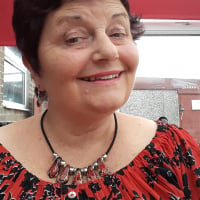
Is Self-Employment the Answer?
Options
ElizabethLWright
Online Community Member Posts: 4 Connected
My name is
Elizabeth. I’m a 40-year-old, limb different Aussie living in the North of
England. I’m a Paralympic medalist from years ago, and now I speak for a living
as well as write about my lived experiences of disability.
The beginning of my employment journey
I have been fighting for inclusion my whole life, even with the Australian disability anti-discrimination laws that came into play in 1992. This struggle for inclusion has led me on a journey to self-employment, here is my story…

“You’re qualified for this job, but I don’t think you will physically manage this type of work, there’s no point in continuing on with the interview.”
The man stood from behind his desk and gestured towards the door. I sat there gobsmacked. It was the first job interview that I had attended on my own, and I felt my excitement wane into disbelief.
The job was for a marketing role in a house cladding company. I was in the midst of a marketing course at a further education institution; and whilst this cladding company wasn’t my dream job, I certainly recognised it for the potential stepping stone it could be. Yet I’d just, metaphorically, had the door slammed in my face because of my disability.
I was 19 years old when this happened. I lacked the confidence to stand up to this man and tell him that he was discriminating against me.
Academia
This interview began a pattern in my life of bad interviews and shattered employment dreams. In the end I decided the only thing I could do was to go back to university. The idea was to become an academic. Surely academia wouldn’t let me down.

After I completed my Masters degree I moved to the UK, I dreamed of working in the hallowed halls of Cambridge or Oxford. Applying for academic jobs, on each application, I ticked the “disability” box in the disclosure section. Interviews started rolling in. Despite this, I was never exactly what they were looking for.
It took me a few weeks to realise what was happening. By ticking the “disability” box and having the bare minimum requirements for the job I was automatically being selected for interview. In the end, I was always beaten to the post. My dreams of being an academic were shattered.
Taking employment into my own hands
It was around this time that the London Paralympics were kickstarting. Sick of trying to find work and failing at the last hurdle, I decided that I would take employment into my own hands.
During my time as a Paralympian I had caught the public speaking bug. I decided to take up the microphone again and started contacting schools about coming to speak to their pupils. When I received my first confirmed booking I realised there was potential to earn a living this way.
It has been ten years since I became self-employed. Whilst self-employment can cause its own anxieties and financial worries, more so than a “traditional” job, the benefits far outweigh the pain.

Being a disabled person can mean many things for many people. It can have an impact on your energy levels, physical capabilities, and even your mental health. Traditional work situations may not work for all disabled people. If a company can’t meet reasonable adjustment needs or has a problematic work culture, work can become difficult for a disabled person.
Being self-employed has meant that I can manage my calendar, ensuring that I can slot in rest days that work for me. It also means that I can control who I work with and how. This ensures that all my needs are met in any work situation that I find myself in. There is a sense of freedom in self-employment that a traditional job may not have.
So, if traditional employment is a struggle do consider what you can bring to the world through self-employment— you might just find it enables you to thrive.
You can follow Liz’s work by reading her blog or Twitter.
If you would like support getting into work then take a look at Scope's employment services to see how we could help. There also is employment information on our website, as well as information about workplace discrimination.
Have you ever been self-employed? What are your interview experiences like? Let us know in the comments below!
5
Comments
-
Not me but my cousin has. She has a free and easy personality so she prefers self employment. She currently works in Britain as a freelance childcare provider. And she loves it truly. She enjoys being able to pick out her own hours etc.
Since she uses a wheelchair due to extensive paralysis of her lower body due to open spina bifida, she thinks that traditional jobs are not practical. It means that she can also attend any doctor appointments or take a break if she desires to as well. It even enables her to go to her university classes (she is a mature twenty three year old student) and earn some money to support herself too. She studies when she is not at work.
I agree.
2 -
At 71 with mobility problems and being bipolar means I stand about as much chance of getting a job as a chocolate in hell, so I've decided that self-employment is the way forward. As I pointed out to a shop assistance once, who literally looked down on me on my mobility scooter (there's no-one to push a wheelchair for me) it's my legs that don't work, gob and brain work fine. I've been written off as a crippled old biddy fit for nothing. So I've started my own company and now it is all hands to make it work.4
-
brilliant well done i use an engine crane to lift parts whilst working a caravan mover to move my trailer big mats to work lying down gardners kneeling seat to get back up a magnet on a stick for all the dropped bolts i hope you have chosen something you are passsionate about or a hobby with enthusiasm and a real love of what you are doing you cant fail enjoy !!!!1
-
I have always faced a barrier where working is concerned. I have hydrocephalus as well as other disabilities non of which are visible. Having hydrocephalus means that the part of my brain that help me learn new things and retain information doesn't work properly. I have tried working for other people put have always struggled and just found myself getting really stressed out. I now work for myself as a craft worker. I can work at my own pace and have no-one to moan at me if I get things wrong.1
-
All these stories are totally amazing! You fantastic show people that disability doesn`t have to mean your destined for the scrap heap. I`m sooo proud of you all!!!
1 -
Love these stories, so inspiring. I have two stickers on my wheelchair. One says disability does not mean inability. And the says my legs don't work but my mind is fine. I too am self employed and manage my work load to suit me. It's great to hear uplifting stories you all rock1
-
@ElizabethLWright
Thankyou so much for sharing your amazing story. You are an inspiration to others and proof to others that if you keep moving forward and work hard at what you want it is achievable.
I have a rare disease and in alot of pain 80%of the time, night and day and find it hard to find appropriate employment as I'm in and out of hospital alot and if I'm not in hospital I'm in bed trying to sleep off the pain.
I think self employment will be ideal for me but I have to find something that will fit around my life and what I can do when poorly.
Thankyou again for sharing and it would be great to talk to you.
Take care.
Tammy2 -
Thank you everyone for your awesome comments. And for sharing your experiences!1
Categories
- All Categories
- 15.2K Start here and say hello!
- 7.2K Coffee lounge
- 87 Games den
- 1.7K People power
- 119 Announcements and information
- 24.1K Talk about life
- 5.7K Everyday life
- 397 Current affairs
- 2.4K Families and carers
- 863 Education and skills
- 1.9K Work
- 523 Money and bills
- 3.6K Housing and independent living
- 1K Transport and travel
- 880 Relationships
- 255 Sex and intimacy
- 1.5K Mental health and wellbeing
- 2.4K Talk about your impairment
- 863 Rare, invisible, and undiagnosed conditions
- 921 Neurological impairments and pain
- 2.1K Cerebral Palsy Network
- 1.2K Autism and neurodiversity
- 39.1K Talk about your benefits
- 5.9K Employment and Support Allowance (ESA)
- 19.5K PIP, DLA, ADP and AA
- 8.1K Universal Credit (UC)
- 5.6K Benefits and income



